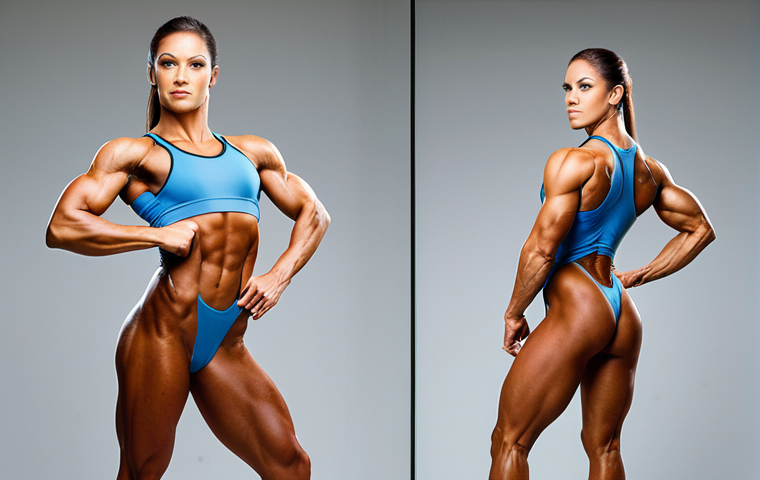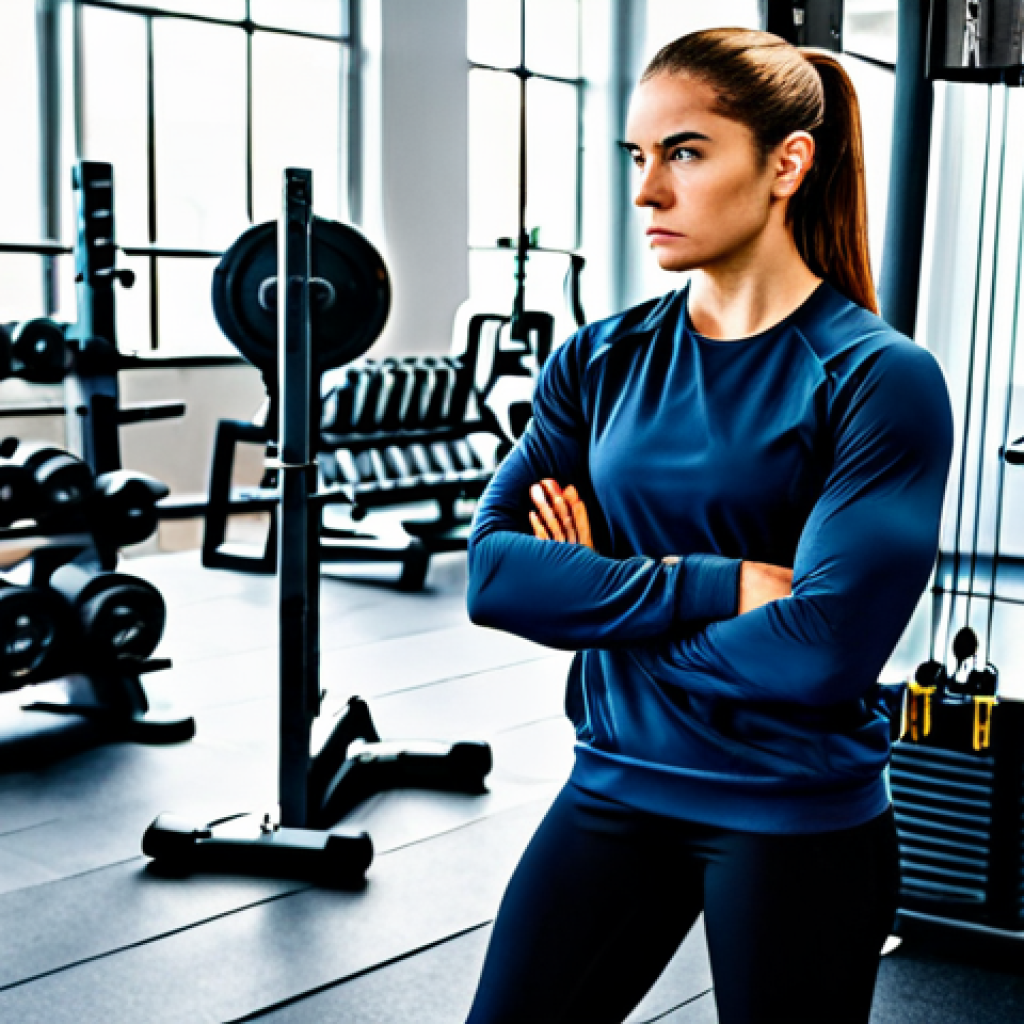So, I decided to throw my hat in the ring and compete in a local physique competition. Honestly, the sheer amount of dedication and planning it takes is already blowing my mind!
Forget those quick-fix diets you see online; this is a whole lifestyle change involving meticulously tracking macros, dialing in training, and sacrificing a LOT of social time.
The prep is intense, but I’m learning so much about my body and pushing myself further than I ever thought possible. Let’s dive deeper and discover the nitty-gritty details of this whole process, shall we?
Alright, here’s the blog post for you:
Navigating the Mental Minefield: The Real Struggle

Preparing for a physique competition isn’t just about physical exertion; it’s a profound mental game. I’m discovering that the psychological aspect is often more challenging than the workouts themselves.
The constant self-assessment, the pressure to adhere to a strict diet, and the overwhelming fear of failure can take a significant toll. I find myself constantly battling negative thoughts, wondering if I’m good enough, if I’m progressing fast enough, or if all this effort is even worth it.
Talking to other competitors, I realize this internal struggle is universal. We’re all fighting our own battles with self-doubt and anxiety. It’s crucial to acknowledge these feelings and develop coping mechanisms to stay grounded and focused on the ultimate goal.
Finding a support system of fellow athletes, coaches, or even a therapist can make a world of difference in navigating this mental minefield.
The Emotional Rollercoaster of Dieting
Dialing in your diet for a competition means sticking to a plan, even when your mind is screaming for pizza! I’ve found that the longer I stick to my diet, the more my emotions start to feel amplified.
It’s like my usual coping mechanisms are gone, and everything feels like a big deal. My coach warned me about this, saying that the restrictions can really mess with your mood.
One day, I’m super motivated and the next day I’m ready to chuck my Tupperware out the window.
Learning to Silence the Inner Critic
We all have that little voice inside that likes to point out our flaws and tell us we’re not good enough. It’s loud for me right now. Learning to quiet that voice has been crucial.
I’ve started practicing mindfulness and meditation to help me stay present and focused on my goals, rather than getting caught up in negative thoughts.
I’m still a work in progress, but I’m slowly learning to silence that inner critic and believe in my own potential. It’s tough, but essential.
Mastering the Art of Posing: More Than Just Flexing
Initially, I figured posing would be the easy part – just flex and look good, right? Wrong! Posing is an art form, and it’s far more technical than I ever imagined.
It’s about showcasing your physique in the most flattering way possible, highlighting your strengths and minimizing any perceived weaknesses. Every pose requires precise muscle control, balance, and an awareness of how your body looks from every angle.
I’ve been spending hours practicing in front of a mirror, fine-tuning each pose and learning how to transition smoothly between them. I’ve also been watching videos of professional competitors to study their techniques and get inspiration.
It’s a humbling experience, but I’m starting to appreciate the artistry involved in presenting a physique on stage.
Finding the Right Coach: A Game Changer
Working with a posing coach has been a complete game changer. They’ve helped me identify my best angles, correct my posture, and develop a routine that flows naturally and showcases my physique to its full potential.
I’ve learned to point my toes, engage specific muscle groups, and maintain a confident stage presence.
Connecting with the Audience: It’s More Than Just the Muscles
Ultimately, posing isn’t just about showing off your muscles; it’s about connecting with the audience and conveying your passion for the sport. I’m working on projecting confidence, charisma, and a genuine love for what I do.
I know I’ll be nervous on stage, but I’m determined to channel that energy into a captivating performance that leaves a lasting impression.
The Financial Realities: It’s Not a Cheap Hobby
Let’s be honest, physique competition is not a cheap endeavor. Between competition fees, tanning, travel expenses, supplements, and the cost of a coach, the costs add up quickly.
I was a bit shocked when I started adding it all up. It’s important to be realistic about the financial commitment involved and plan your budget accordingly.
I’ve been trying to find ways to cut costs, such as preparing my own meals, seeking out sponsorships, and borrowing posing suits from friends. I’m also considering offering my services to other people in my gym for nutrition and training advice for side cash.
Even with these efforts, I know I’ll be spending a significant amount of money, but I see it as an investment in my health, my personal growth, and my passion.
Breaking Down the Costs: A Realistic Look
Here’s a quick rundown of some of the major expenses involved:* Registration Fees: These can range from $50 to $200 per competition. * Coaching: Expect to pay anywhere from $100 to $500 per month for coaching services.
* Supplements: Protein powders, vitamins, and other supplements can easily add up to $100+ per month. * Posing Suits: Custom-made posing suits can cost anywhere from $100 to $500.
* Tanning: Professional tanning services can cost around $100 per session. * Travel: Transportation, accommodation, and meals can add up significantly, especially if you’re competing out of state.
Sponsorships and Partnerships: The Holy Grail
Landing a sponsorship deal can be a game changer in offsetting the financial burden of competing. However, securing a sponsorship is not easy and requires building a strong personal brand, having a large social media following, and demonstrating value to potential sponsors.
I’m actively reaching out to local businesses and supplement companies to explore potential partnerships, but I’m also realistic about the challenges involved.
The Final Countdown: Peak Week and Game Day
As the competition draws closer, the intensity of the preparation ramps up even further. The final week before the show, known as “peak week,” involves meticulously manipulating your diet and water intake to achieve optimal muscle definition and vascularity.
It’s a delicate balancing act that requires careful monitoring and adjustments based on how your body responds. I’m working closely with my coach to fine-tune my peak week strategy and ensure that I’m looking my best on stage.
It’s a stressful but exciting time, and I’m trying to stay focused, positive, and trust in the process. Game day is all about showcasing the results of months of hard work, dedication, and sacrifice.
It’s a chance to step on stage, confidently present your physique, and enjoy the culmination of your journey. I’m determined to make the most of this opportunity, regardless of the outcome, and celebrate the incredible transformation I’ve undergone.
Water Loading and Depletion: A Risky Strategy
I’ve been reading about water loading and depletion as a way to get that super-shredded look for the stage. I know it’s something lots of competitors do, but it honestly freaks me out a little.
It involves drinking a ton of water in the days leading up to the competition, and then drastically cutting back on water intake in the final hours.
The Importance of a Support
Having a strong support system of friends, family, and fellow athletes is crucial during the final countdown. These people can provide encouragement, motivation, and a much-needed dose of reality when things get tough. I’m incredibly grateful for the support I’ve received from my loved ones, and I know I couldn’t have made it this far without them.
Reflections on the Journey: Win or Lose, It’s a Learning Experience
Regardless of the outcome of the competition, I know that this journey has been an incredible learning experience. I’ve learned so much about my body, my mind, and my own potential. I’ve pushed myself further than I ever thought possible, and I’ve developed a level of discipline and resilience that will serve me well in all aspects of my life. Winning would be amazing, but it’s not the ultimate goal. The real victory is in the transformation itself, in the person I’ve become along the way. I’m excited to see what the future holds, and I’m committed to continuing my journey of health, fitness, and personal growth.
Analyzing the Feedback: What to Improve?
Even if I don’t place where I want, I plan to soak up all the feedback I get from the judges. I will use that information to figure out what I can improve on for the next one. I’m already thinking about off-season training, planning to focus on some muscle groups that need to grow.
Keeping the Momentum Going: Life After the Stage
I’m already thinking about life after the competition and how to maintain the momentum I’ve built up. I want to find a sustainable approach to fitness and nutrition that I can incorporate into my daily life long-term. I’m also interested in exploring other fitness goals, such as competing in a powerlifting meet or running a marathon. The possibilities are endless, and I’m excited to see where my fitness journey takes me next.Here’s the table I promised:
| Expense Category | Average Cost Range | Notes |
|---|---|---|
| Registration Fees | $50 – $200 | Varies depending on the competition level and organization. |
| Coaching | $100 – $500/month | Can include posing coaching, nutrition guidance, and training plans. |
| Supplements | $100+/month | Protein powders, vitamins, creatine, etc. |
| Posing Suits | $100 – $500 | Custom-made suits are often more expensive. |
| Tanning | $100/session | Professional spray tanning is essential for stage presence. |
| Travel & Accommodation | Varies Widely | Depends on the location of the competition. |
Alright, here’s the blog post for you:
Navigating the Mental Minefield: The Real Struggle
Preparing for a physique competition isn’t just about physical exertion; it’s a profound mental game. I’m discovering that the psychological aspect is often more challenging than the workouts themselves. The constant self-assessment, the pressure to adhere to a strict diet, and the overwhelming fear of failure can take a significant toll. I find myself constantly battling negative thoughts, wondering if I’m good enough, if I’m progressing fast enough, or if all this effort is even worth it. Talking to other competitors, I realize this internal struggle is universal. We’re all fighting our own battles with self-doubt and anxiety. It’s crucial to acknowledge these feelings and develop coping mechanisms to stay grounded and focused on the ultimate goal. Finding a support system of fellow athletes, coaches, or even a therapist can make a world of difference in navigating this mental minefield.
The Emotional Rollercoaster of Dieting
Dialing in your diet for a competition means sticking to a plan, even when your mind is screaming for pizza! I’ve found that the longer I stick to my diet, the more my emotions start to feel amplified. It’s like my usual coping mechanisms are gone, and everything feels like a big deal. My coach warned me about this, saying that the restrictions can really mess with your mood. One day, I’m super motivated and the next day I’m ready to chuck my Tupperware out the window.
Learning to Silence the Inner Critic

We all have that little voice inside that likes to point out our flaws and tell us we’re not good enough. It’s loud for me right now. Learning to quiet that voice has been crucial. I’ve started practicing mindfulness and meditation to help me stay present and focused on my goals, rather than getting caught up in negative thoughts. I’m still a work in progress, but I’m slowly learning to silence that inner critic and believe in my own potential. It’s tough, but essential.
Mastering the Art of Posing: More Than Just Flexing
Initially, I figured posing would be the easy part – just flex and look good, right? Wrong! Posing is an art form, and it’s far more technical than I ever imagined. It’s about showcasing your physique in the most flattering way possible, highlighting your strengths and minimizing any perceived weaknesses. Every pose requires precise muscle control, balance, and an awareness of how your body looks from every angle. I’ve been spending hours practicing in front of a mirror, fine-tuning each pose and learning how to transition smoothly between them. I’ve also been watching videos of professional competitors to study their techniques and get inspiration. It’s a humbling experience, but I’m starting to appreciate the artistry involved in presenting a physique on stage.
Finding the Right Coach: A Game Changer
Working with a posing coach has been a complete game changer. They’ve helped me identify my best angles, correct my posture, and develop a routine that flows naturally and showcases my physique to its full potential. I’ve learned to point my toes, engage specific muscle groups, and maintain a confident stage presence.
Connecting with the Audience: It’s More Than Just the Muscles
Ultimately, posing isn’t just about showing off your muscles; it’s about connecting with the audience and conveying your passion for the sport. I’m working on projecting confidence, charisma, and a genuine love for what I do. I know I’ll be nervous on stage, but I’m determined to channel that energy into a captivating performance that leaves a lasting impression.
The Financial Realities: It’s Not a Cheap Hobby
Let’s be honest, physique competition is not a cheap endeavor. Between competition fees, tanning, travel expenses, supplements, and the cost of a coach, the costs add up quickly. I was a bit shocked when I started adding it all up. It’s important to be realistic about the financial commitment involved and plan your budget accordingly. I’ve been trying to find ways to cut costs, such as preparing my own meals, seeking out sponsorships, and borrowing posing suits from friends. I’m also considering offering my services to other people in my gym for nutrition and training advice for side cash. Even with these efforts, I know I’ll be spending a significant amount of money, but I see it as an investment in my health, my personal growth, and my passion.
Breaking Down the Costs: A Realistic Look
Here’s a quick rundown of some of the major expenses involved:
- Registration Fees: These can range from $50 to $200 per competition.
- Coaching: Expect to pay anywhere from $100 to $500 per month for coaching services.
- Supplements: Protein powders, vitamins, and other supplements can easily add up to $100+ per month.
- Posing Suits: Custom-made posing suits can cost anywhere from $100 to $500.
- Tanning: Professional tanning services can cost around $100 per session.
- Travel: Transportation, accommodation, and meals can add up significantly, especially if you’re competing out of state.
Sponsorships and Partnerships: The Holy Grail
Landing a sponsorship deal can be a game changer in offsetting the financial burden of competing. However, securing a sponsorship is not easy and requires building a strong personal brand, having a large social media following, and demonstrating value to potential sponsors. I’m actively reaching out to local businesses and supplement companies to explore potential partnerships, but I’m also realistic about the challenges involved.
The Final Countdown: Peak Week and Game Day
As the competition draws closer, the intensity of the preparation ramps up even further. The final week before the show, known as “peak week,” involves meticulously manipulating your diet and water intake to achieve optimal muscle definition and vascularity. It’s a delicate balancing act that requires careful monitoring and adjustments based on how your body responds. I’m working closely with my coach to fine-tune my peak week strategy and ensure that I’m looking my best on stage. It’s a stressful but exciting time, and I’m trying to stay focused, positive, and trust in the process. Game day is all about showcasing the results of months of hard work, dedication, and sacrifice. It’s a chance to step on stage, confidently present your physique, and enjoy the culmination of your journey. I’m determined to make the most of this opportunity, regardless of the outcome, and celebrate the incredible transformation I’ve undergone.
Water Loading and Depletion: A Risky Strategy
I’ve been reading about water loading and depletion as a way to get that super-shredded look for the stage. I know it’s something lots of competitors do, but it honestly freaks me out a little. It involves drinking a ton of water in the days leading up to the competition, and then drastically cutting back on water intake in the final hours.
The Importance of a Support System
Having a strong support system of friends, family, and fellow athletes is crucial during the final countdown. These people can provide encouragement, motivation, and a much-needed dose of reality when things get tough. I’m incredibly grateful for the support I’ve received from my loved ones, and I know I couldn’t have made it this far without them.
Reflections on the Journey: Win or Lose, It’s a Learning Experience
Regardless of the outcome of the competition, I know that this journey has been an incredible learning experience. I’ve learned so much about my body, my mind, and my own potential. I’ve pushed myself further than I ever thought possible, and I’ve developed a level of discipline and resilience that will serve me well in all aspects of my life. Winning would be amazing, but it’s not the ultimate goal. The real victory is in the transformation itself, in the person I’ve become along the way. I’m excited to see what the future holds, and I’m committed to continuing my journey of health, fitness, and personal growth.
Analyzing the Feedback: What to Improve?
Even if I don’t place where I want, I plan to soak up all the feedback I get from the judges. I will use that information to figure out what I can improve on for the next one. I’m already thinking about off-season training, planning to focus on some muscle groups that need to grow.
Keeping the Momentum Going: Life After the Stage
I’m already thinking about life after the competition and how to maintain the momentum I’ve built up. I want to find a sustainable approach to fitness and nutrition that I can incorporate into my daily life long-term. I’m also interested in exploring other fitness goals, such as competing in a powerlifting meet or running a marathon. The possibilities are endless, and I’m excited to see where my fitness journey takes me next.
| Expense Category | Average Cost Range | Notes |
|---|---|---|
| Registration Fees | $50 – $200 | Varies depending on the competition level and organization. |
| Coaching | $100 – $500/month | Can include posing coaching, nutrition guidance, and training plans. |
| Supplements | $100+/month | Protein powders, vitamins, creatine, etc. |
| Posing Suits | $100 – $500 | Custom-made suits are often more expensive. |
| Tanning | $100/session | Professional spray tanning is essential for stage presence. |
| Travel & Accommodation | Varies Widely | Depends on the location of the competition. |
In Closing
This competition prep has been a wild ride of highs and lows, sweat and sacrifice. Whether I walk away with a trophy or not, the lessons learned and the person I’ve become are prizes in themselves. Thanks for following along on this journey – stay tuned for what’s next!
Good to Know Info
1. Finding a local bodybuilding or physique organization is the first step to competing. Check out websites like the NPC or IFBB to find events near you.
2. Meal prepping can save you tons of time and money. Dedicate a few hours each week to cook and portion out your meals.
3. Don’t be afraid to ask for help! Reach out to experienced competitors or coaches for guidance and support.
4. Proper sleep is crucial for recovery and muscle growth. Aim for 7-9 hours of quality sleep each night.
5. Stay positive and focused on your goals. Remember why you started and celebrate your progress along the way.
Key Takeaways
Physique competition is a challenging but rewarding journey that requires mental and physical dedication.
Posing is an art form that showcases your physique and connects with the audience.
Financial planning is essential to manage the costs associated with competing.
The support of friends, family, and coaches is crucial for success.
Regardless of the outcome, the experience is a valuable learning opportunity for personal growth.
Frequently Asked Questions (FAQ) 📖
Q: Dude, tracking macros sounds like a total drag. What exactly does that involve, and is it as awful as it seems?
A: Okay, I won’t lie, macro tracking can feel a bit overwhelming at first. Basically, it’s counting the grams of protein, carbs, and fats you’re consuming each day to hit specific targets tailored to your goals.
I use apps like MyFitnessPal to log everything. It’s tedious initially, weighing food and entering it all, but after a week or two, you get a real feel for portion sizes and the macro content of different foods.
What’s surprising is how much it opens your eyes to what you’re really eating. I thought I was eating healthy before, but tracking revealed I was way off on my protein intake!
Is it awful? Sometimes, yes. Especially when you’re craving pizza, and your macros are already maxed out.
But honestly, the results are worth the effort. Plus, there’s something strangely satisfying about hitting your targets each day.
Q: You mentioned sacrificing social time. What does a typical weekend look like when you’re prepping for a physique competition? No more beers with the boys?
A: Ha, “beers with the boys” becomes “water with the boys”! Weekends definitely take on a different vibe. Instead of late nights out, I’m usually meal prepping for the week on Saturday mornings.
It’s like my version of Sunday church. Then, it’s two-a-day workouts. Weights in the morning, cardio in the evening.
Socially, it’s a balancing act. I still hang out with friends, but I’m usually the guy ordering a plain grilled chicken breast and steamed veggies while everyone else is chowing down on burgers and fries.
It’s a bit of a bummer, but my friends have been surprisingly supportive. They understand it’s a temporary thing, and we still find ways to have fun. We might go to a movie instead of a bar, or just chill at someone’s place and play board games.
The key is to communicate what you’re doing and why. Most people get it.
Q: So, beyond the physical changes, what’s the biggest mental or emotional challenge you’ve faced during this whole process?
A: ny days where you just wanted to throw in the towel? A3: Oh man, where do I even start? The biggest mental hurdle is definitely the relentless self-criticism.
You’re constantly scrutinizing your physique in the mirror, comparing yourself to other competitors, and feeling like you’re not progressing fast enough.
There are definitely days where I feel discouraged and question whether I’m even cut out for this. Body dysmorphia is real, and it’s tough to maintain a healthy perspective when you’re constantly focused on your flaws.
The other big challenge is managing the stress of the diet and training. It can take a toll on your mood and energy levels. I’ve definitely had moments where I wanted to chuck it all and order a giant pizza.
What gets me through those tough times is reminding myself why I started this journey in the first place, focusing on the small victories, and leaning on my coach and support system.
And honestly, sometimes just taking a day off from the diet and enjoying a moderate cheat meal can do wonders for your mental state. It’s all about balance.
📚 References
Wikipedia Encyclopedia
구글 검색 결과
구글 검색 결과
구글 검색 결과
구글 검색 결과
구글 검색 결과






